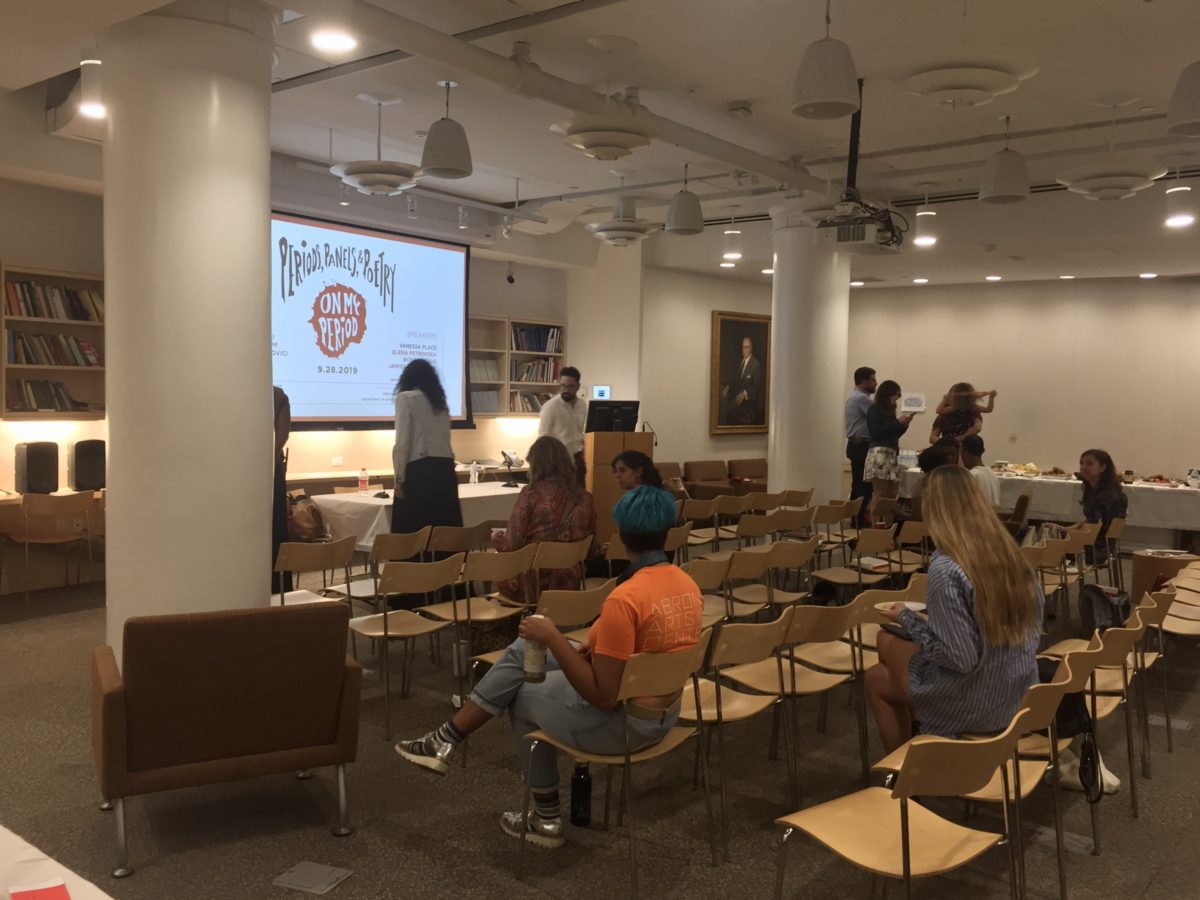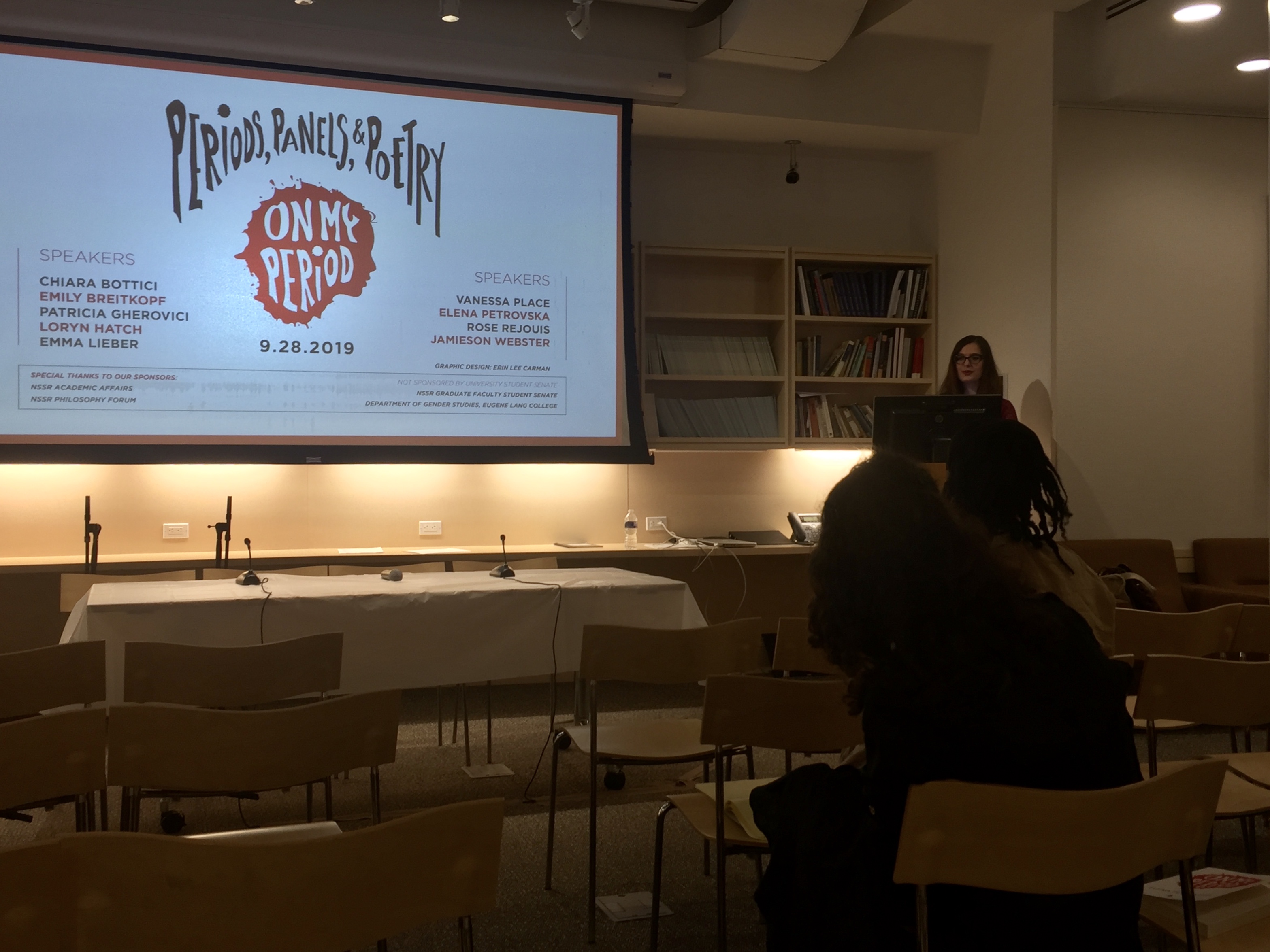This article appears in our October print issue.You can pick up a copy on newsstands around campus, or at our newsroom in room 520 in the University Center.
This article was originally published on Oct. 10. It has since been edited and republished to reflect the inclusivity within On My Period: Poems, and the fact that womxn who are not cisgender menstruate.
Elena Petrovska, an NSSR Psychology grad student, aimed to destigmatize menstruation by writing poems about periods in her 2018 book, On My Period: Poems.
Petrovska explored the contents of her book along with her collaborators on Sept. 28 at the event, “Periods, Panels & Poetry.” It featured several panels, poetry readings, an open mic, and debunked many menstrual myths from 1 to 8 p.m in the Wolf Conference Room in the Albert and Vera Academic Center on E. 16th St.
“I decided to write poetry on my period for nine months. So instead of having a baby, I made a book all by myself,” Petrovska said to the audience.
At approximately 1:30 p.m., Loryn Hatch, one of the panelists, introduced herself with an ironic remark. “I was hoping I’d be on my period, but I’m about five months late,” said Hatch, as she jokingly referred to her pregnancy. During her segment, Hatch discussed the historical opinions of periods and menstruation through a psychoanalytic lens.
Another panelist, Rose Rejouis, professor of Literary Studies at Lang, was intrigued by the idea of creation myths, menstruation and giving birth within literature. Rejouis noticed a correlation between different mythologies and religions. Masculine figures were considered the creators of the world, despite the feminine association with birth.
When asked what impact this event might have on people, Rejouis said, “I think it’s radical and a very thoughtful feminist project.”
Erin Carman, who is finishing her BFA in Integrated Design and beginning her MA in Strategic Design at Parsons, was the main designer of Petrovska’s book and the program cover. She also designed the buttons and keychains for attendees and earrings for the panelists. The design depicts the profile of a person that doubles as a drop of blood.
“I think there’s still such a taboo around the world. You’re not even allowed to openly talk about it. It’s very talked around,” said Carman about menstruation in the media. “It’s like those commercials on T.V. for pads where you’re pouring blue, clear liquid onto it to insinuate. It’s just very strange.”
Carman spoke about the importance of an event like this. “I like that it’s being talked about very openly and directly from a number of different perspectives and I hope that happens more.”

Photo by Sophie Lee
At around 3 p.m., there was a panel discussion featuring Jamieson Webster, a faculty member of The Schools of Public Engagement, Patricia Gherovici, psychoanalyst and a speaker for NSSR Psychology, and Emma Lieber, a faculty member at Lang. The panelists were once Petrovska’s professors during her time at Lang and NSSR.
The final panelists, Vanessa Place, criminal appellate attorney and writer, and Chiara Bottici, associate professor of philosophy at NSSR, performed the “Menstrual Rosary,” referencing the Virgin Mary. The performance paid homage to Petrovka’s book and critiqued ads for menstruation products.
Petrovska concluded the event by reciting several period-themed poems from her book. Petrovska talked about how periods are used to disregard people’s feelings, and how people who get a period are seen as overly emotional. “It invalidates people’s opinions of menstruators,” Petrovska said.
As the evening ended and the reception began, more people arrived. The table served white wine and red velvet cake.
Petrovska pointed out that although her book is about menstruation and her own experiences, she was not writing to a specific audience.
“I wrote it for people who have had similar experiences — and even those who haven’t,” Petrovska said. “People who don’t have their period read the book– it’s an educating thing,” she said.
“I was hoping to spark conversation, like what we had at the end, and I was hoping to have a place where people can openly and liberally say, ‘I’m on my period,’” Petrovska said.
On My Period: Poems is available digitally and physically through Adelaide Books.







